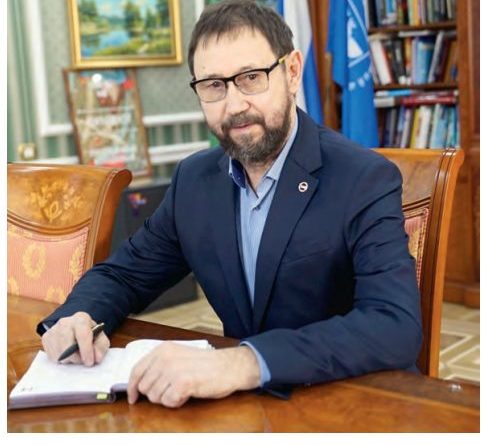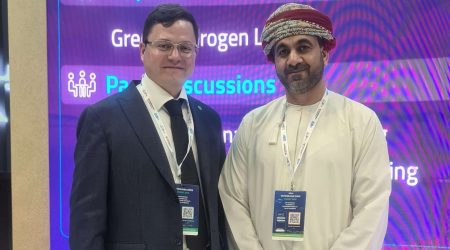Danis Nurgaliev: Development of technologies and equipment for the oil and gas industry is a new way to develop the country as a whole
Vice-Rector for Earth Sciences gave an interview to Burenie i Neft, a Russian oil industry magazine.
– Danis Karlovich, what forecast can you give for the oil and gas industry in the near future from the point of view of a geologist? Will oil run out?
– One can often hear in the media that the Earth is running out of oil reserves, and Russia will only have enough oil for 20 to 30 years. Such statements should be considered not quite true. In fact, there are a lot of oil reserves both on the Earth and in the Russian Federation. For example, most of the Arctic shelf and Siberia have not been explored, and there is a huge number of fields there that have not yet been discovered and not put on the balance sheet. In addition, there is such an indicator as oil recovery factor (ORF), and in Russia it averages 0.3-0.4. It means that we extract 30-40% of oil from the field, and the rest, “unaccounted” 60-70%, remain in the ground. That is, there are still as much reserves in these fields alone, at least as much as we wanted to extract from them with the available technologies.
– Can we get back to those 60-70%?
– In order to produce the remaining 60-70%, we need to use more efficient technologies. It turns out that by improving technologies we can increase reserves.
To do this, we need to continue to develop large fields where there is still this “unaccounted” oil, as there are already wells, pipelines, personnel, social infrastructure, and bring the oil recovery rate up to 90%.
New methods of oil production may be fundamentally different than today. Therefore, in order to create them, it is necessary to spend a lot of time and money on their development. And it is necessary to realize that the more difficult it is to extract oil residue, the more expensive the technology will be. Eventually, hydrocarbon extraction technologies may become so expensive that renewable energy will become cost-effective – substantially cheaper and more competitive than energy generated from fossil fuels. When that will happen – no one knows, but it won’t happen very soon. Fiscal policy and, of course, scientific discoveries in this and related fields will play a big role.
– Certain sources are also speculating how Russian oil is not in demand anymore…
At least in the short term, it is very difficult to replace Russia’s share of hydrocarbons in the global energy sector. All the more so because in the coming years, the reserves and quality of oil in the largest fields around the world will deteriorate.
Technologies will have to be significantly improved, hence the need to invest. Objectively, the situation is as follows: there is a lot of oil, but in order to produce it, we need to invest more and more every year (prospecting, exploration, creation of infrastructure, development and implementation of technologies). At the same time, energy consumption in the world is constantly growing. Experts claim that the maximum oil consumption has not yet been reached. At best, in terms of the development of renewable energy technologies and their real use, it may happen in 5 years. But what can be said for sure is that oil will be used as long as it is in the ground and can be extracted. The current state, trends and dynamics of renewable energy development show that it is unlikely that it will be possible to completely abandon fossil carbon fuels before the end of the century.
In the coming years, oil will become more expensive and more and more oil will be needed. The same applies to Russian oil.
Looking ahead, it can be noted that there are several scientific discoveries and technologies that can significantly bring the end of the era of carbon-based fossil fuels, and the main among them are the practical realization of high-temperature superconductivity and the creation of industrial controlled thermonuclear reaction.
– From your standpoint, is there enough effort in Russia to discover new reserves?
– I think not. They proceed from a simple logic – “we need to increase reserves in line with how much we have extracted”. This is not enough. To choose the right oil and gas strategy, we need to know about all possible resources. Then we could choose between the development and implementation of expensive technologies and the development of new deposits and fields. I am convinced that there are territories where there is a lot of oil and gas, and they have not even been looked for yet. In principle, it is the duty of the state to deal with these issues, to assess the possible resources of the territories and offer companies to license them, taking into account the strategic interests of the country. But companies also have to show that while extracting hydrocarbon reserves in one place, they increase their reserves in another place through geological exploration. But sometimes companies show a positive increase in reserves due to recalculations. Real exploration works that allow to increase reserves are very expensive, such as drilling and 3D seismic testing. That is why it is very important to create cheap and express technologies for ranking territories by prospects for oil and gas deposits. As a rule, these are remote or robotic, for example, unmanned systems.
In most cases, new territories do not have roads and other infrastructure, they are inaccessible areas. Therefore, we also need a coordinated state strategy, tax policy, a plan for the development of territories, infrastructure development, and attracting personnel. Today there is no such plan. Russia, as one of the most resource-rich countries in the world, should invest in the search and exploration of deposits. This is a strategically necessary process. Any already existing infrastructure should be the basis for this process. For example, there is a certain oil or gas pipe in Western Siberia. Along this pipe lie vast undeveloped territories. Between the wells there are empty spaces of hundreds of kilometers. Among them there are potentially promising territories. They also need to be developed.
Or, a company has discovered a promising area, it needs to find funds for exploration and infrastructure construction, but this is a long-term project that will pay off only in 10-15 years. Will the company invest in such a situation? A big question. If exploration and development of this territory is in line with the Strategy, then it is necessary to involve state financial and legal mechanisms that should allocate funds for these purposes, or apply preferential taxation.
– There was much more exploration in the Soviet period, and yet there is still about the same reserve estimation.
– On the one hand, today there are completely different technologies, such as expensive but effective 3D seismic. And that is why fewer empty wells are being drilled. The decrease in drilling volumes is also due to the fact that today we know much better the geology of the regions where the most wells were drilled. On the other hand, the volume of exploration drilling in new areas is really falling, and this is very bad. Sometimes the increase in reserves is purely theoretical due to recalculation of reserves at old fields. In order to reach real new reserves, it is necessary to increase the volume of drilling. It is quite possible that new fields will be discovered that will be more profitable than those being exploited today.
Since gas and oil will be needed until the end of the century, it is very important to correctly visualize our possible resources and reserves of hydrocarbons of various qualities at least for the next 30-50 years in order to plan properly.
– What are your thoughts of hydrogen energy for the future?
– The essence of hydrogen energy is the use of hydrogen as an energy carrier. Hydrogen energy technologies are methods of storage, transportation of energy carrier (hydrogen) and production of necessary final energy. Today it is becoming clear that hydrogen can be stored and transported much more economically than electricity. That said, producing hydrogen from water or methane is an extremely expensive process that also has a large carbon footprint. It all depends on the origin of the electrical energy used for this. Besides, the world is already short of fresh water from which they want to produce hydrogen. Plus, it’s still unclear how to safely transport and store hydrogen.
The best hydrogen carrier today is methane, which has as many as four hydrogen atoms per carbon atom. It is quite clear that the carbon footprint of this fuel is minimal compared to oil and coal, which provide more than half of the world’s energy today. Therefore, it is incorrect to state that the era of hydrocarbons is over. It is possible that the 21st century will be the century of methane. It is necessary to objectively understand how much energy the world needs and will need, how much of the total amount is covered by hydrocarbons today, and how their substitution will proceed.
– Which exploration technologies do you see as the most promising?
– It is necessary to develop remote technologies (drones, satellite methods). They make it possible to conduct fast, cheap and highly accurate surveys, cover large areas in a short time with minimal use of people.
Seismic survey is very expensive. It is necessary to learn how to drill quickly and cheaply. Such technologies exist in the world. In principle, it is possible to learn how to drill quickly and do without the seismic. Then seismic will be needed only to create a model of the deposit and optimize its development where it will be necessary. It is good because it gives a complete picture of the underground structure of the reservoir, showing the bedding of strata, fractures and blocks. Deposits can be detected and their reserves can be preliminarily estimated by easy, mainly remote, geophysical and geochemical methods. The next step is to perform the seismics, refine the contours of the deposit, and drill an exploration (producing) well.
– What about equipment – who are the primary producers of what we use?
– Today, equipment in geological exploration (geophysical and geochemical methods) is largely imported. But import substitution is already underway in this area, and it is quite possible that in the coming years it will be possible to completely switch to domestic equipment. It is certainly necessary to deal with this. Development of equipment is not only to ensure the independence of various sectors of the economy from foreign supplies, but also a new way of development of the country as a whole. The more intellectual work, the better. Everything is developing – education, science, technology.
– Experts from the Institute of Applied Physics (Russian Academy of Sciences) say they can provide well drilling with ultra-high frequencies.
– I haven’t heard anything like that. I know that there is such an electric pulse method of drilling crystalline rocks, which is very promising. But it is still under development and is not yet widely used in the oil and gas industry. Creating such a fundamentally new method would be a revolution in this field.
– How can the Ministry of Energy contribute to this?
– It is unlikely that the Ministry itself can do it, since it is not its core work. The state represented by the Ministry can allocate a scientific grant. It will be won by several small companies, scientific institutes, which will create the requested technologies. The main thing is that the results of research should not go abroad. As it usually happens, we invent, and then 10-20 years later we buy the technology abroad.
– How would you rate the petroleum businesses’ readiness to introduce innovation?
– In today’s situation, companies are much more receptive to domestic developments than they were a few years ago. In the past, companies used to buy innovations abroad and were satisfied. Today, this possibility has weakened considerably. Some companies have their own research centers, which they believe provide technological advancement. I think it is ultimately unprofitable to maintain an army of scientists within a company, as the complete lack of competition leads to the degeneration of this system. If you outsource, there is always a choice. You can engage various scientific institutes, universities. It is cheaper, more diverse and more competitive. As a result, there will be movement in the system, science will develop, competition between scientific centers will emerge. And companies will get better and cheaper products. This is more favorable for the country as a whole, while universities will develop, the level of education and quality of specialist training will increase. For this, companies can be given some tax preferences.
– Can you please speak a little about your World-Class Research Center in Liquid Hydrocarbons.
- – In 2020, as part of the national project Science and Universities, world-class research centers were established on a competitive basis in strategic areas of technological development of the Russian Federation. In the area of environmentally friendly resource-saving energy, our projectwas supported by a consortium of four universities – Kazan Federal University (the parent organization), Skoltech, Gubkin University, and Ufa Petroleum University. The Center was established to carry out breakthrough research of fundamental and prospecting nature in the oil and gas sphere aimed at solving problems corresponding to the world level of relevance and importance.
– What are the technological foci of the Center?
– Within the Center, we conduct research and develop technologies in three areas.
The first is related to the development of new territories and the development of effective (express and fairly cheap) technologies for assessing the oil and gas content of poorly explored regions and identifying the most promising areas for further study. These technologies use remote satellite and unmanned systems (air, water and underwater) to obtain the necessary information in areas that are currently difficult to access – Eastern Siberia and the shelf. Many interesting technologies and patents have already been obtained here. Some of the technologies are used today in the practice of oil and gas companies (Gazprom, Lukoil, and small oil companies).
The second area is related to increasing the oil recovery factor of large fields at a late stage of development. We create technologies that ensure the most complete recovery of hydrocarbons. In fact, we are creating a new paradigm for the development of such fields, as we are giving them a new life. This is achieved through biogeochemical monitoring of development and original algorithms for processing field and geophysical data. Such technologies have already been applied at Tatneft, and other companies – Rosneft, Lukoil and others – are showing interest.
The third area is the development of technologies that allow efficient production of unconventional oil (high-viscosity, tight oil, shale oil). For example, one of the technologies, which we call underground oil refining, has already been successfully used by companies. The technology is based on the use of special catalysts injected into the reservoir before the reservoir is treated with steam. Chemical transformation of oil takes place in the formation, which leads to increased oil mobility in the porous medium of the formation, increasing the well flow rate. In addition to irreversible viscosity reduction, the content of sulfur and hard-to-treat components in oil is reduced.
Five successful tests have been carried out: one at the Tatneft field, two at the Cuban Boca de Jaruco field together with Zarubezhneft, and two injections at a RITEK-operated field. And today we have new orders from Rosneft, Tatneft, and Zarubezhneft.






